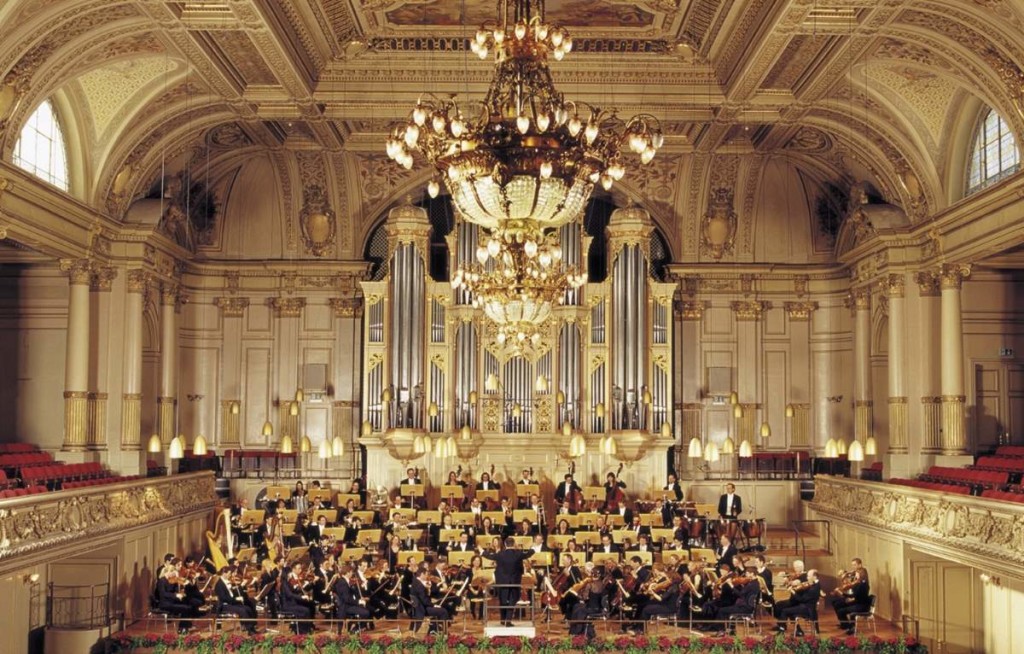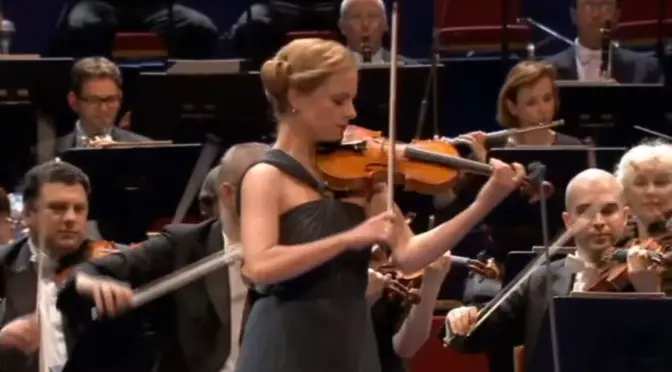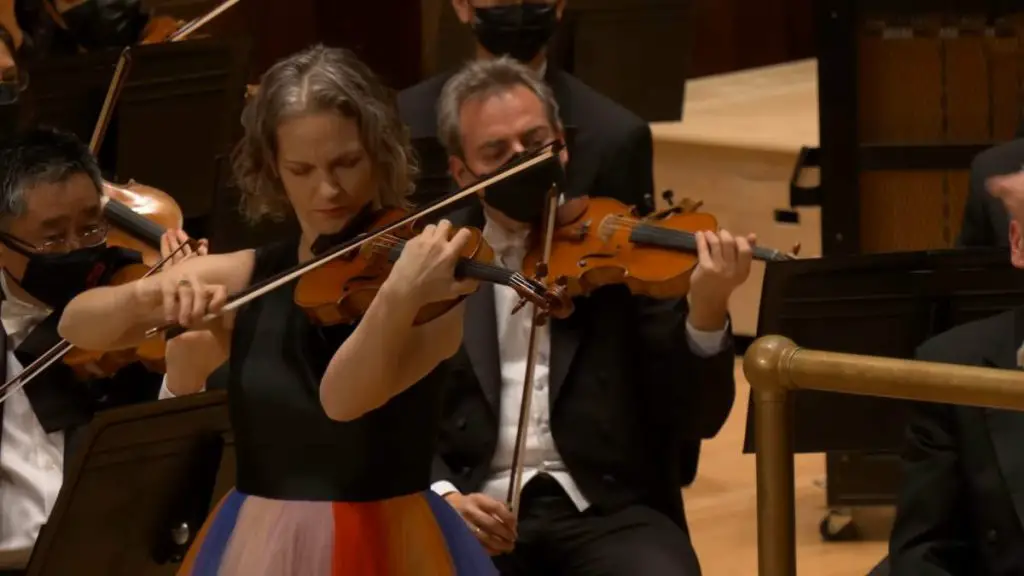Accompanied by the Tonhalle Orchester Zürich, German classical violinist and pianist Julia Fischer performs Antonín Dvořák’s Violin Concerto in A minor, Op. 53 (B.108). Conductor: David Zinman. Recorded during the BBC Proms 2014. Encore: Paul Hindemith – Violin Sonata in G Minor, Op. 11 No. 6, the 3rd movement.
Antonín Dvořák’s Violin Concerto
The Violin Concerto in A minor is considered one of the masterpieces of Dvořák’s so-called Slavic period. It was written in 1879, in close proximity to his first series of Slavonic Dances, the Czech Suite, the Slavonic Rhapsodies, and Symphony No. 6 in D major, with which it shares its compelling folkloric melodies and overall positive expression.
The work was premiered in Prague in 1883 by the Czech violinist and composer František Ondříček (29 April 1857 -12 April 1922), who also gave the Vienna and London premieres. Today it remains an important work in the violin repertoire.
Dvořák was inspired to write the violin concerto after meeting the Hungarian violinist, conductor, composer, and teacher Joseph Joachim (28 June 1831 – 15 August 1907) in 1878, and composed the work with the intention of dedicating it to him.

However, when he finished the concerto in 1879, Joachim became skeptical about it. Joachim was a strict classicist and objected, inter alia, to Dvořák’s abrupt truncation of the first movement’s orchestral tutti. Joachim also didn’t like the fact that the recapitulation was cut short and that it led directly to the slow second movement.
It is also assumed that he was upset with the persistent repetition found in the third movement. However, Joachim never said anything outright and instead claimed to be editing the solo part. He never actually performed the piece in public.
Movements
The concerto’s structure is the classical three movements of fast-slow-fast.
- Allegro ma non troppo
- Adagio ma non troppo
- Finale: Allegro giocoso ma non troppo
1. Allegro ma non troppo
Antonín Dvořák’s Violin Concerto in A minor, Op. 53 (B. 108), is a vibrant and emotionally rich work that showcases the composer’s mastery of melody, orchestration, and his ability to blend classical forms with the folk music of his native Bohemia. The first movement, Allegro ma non troppo, is particularly notable for its lyrical intensity and the seamless integration of solo violin and orchestral textures, reflecting Dvořák’s deep understanding of both the violin’s capabilities and the Romantic concerto tradition.
The movement opens with a brief but dramatic orchestral introduction that sets the stage for the violin’s entrance. This introduction hints at the thematic material that will be developed throughout the movement. When the solo violin enters, it immediately takes up the thematic ideas, presenting them with a combination of virtuosity and expressive depth. The solo part is demanding, requiring a wide range of techniques and a high degree of emotional expressiveness from the performer.
Dvořák’s first movement is structured in a modified sonata form, but with a fluidity that often blurs the lines between exposition, development, and recapitulation. This fluid structure allows for a continuous flow of musical ideas and a close integration of the solo violin with the orchestral accompaniment. The movement is characterized by its lyrical themes, which are at times passionate and at others introspective. Dvořák makes use of a rich harmonic palette to enhance the emotional depth of the music.
One of the movement’s distinctive features is its use of Bohemian folk elements, which Dvořák incorporates into the thematic material. These elements add a unique color and vitality to the music, reflecting the composer’s nationalist leanings and his desire to infuse his compositions with the spirit of his homeland. The rhythmic vitality and melodic contours of these folk-inspired themes contribute to the movement’s overall character and energy.
The development section explores the thematic material in greater depth, with the violin engaging in complex interplay with the orchestra. This section showcases Dvořák’s skill in orchestration and his ability to create dramatic contrasts and build tension. The recapitulation brings a return of the main themes, now transformed and further enriched by the soloist’s and orchestra’s previous explorations.
The movement concludes with a coda that revisits the main themes, bringing the movement to a powerful and satisfying close. The coda serves to highlight the soloist’s virtuosity and the emotional intensity of the music, culminating in a triumphant conclusion that leaves a lasting impression on the listener.
2. Adagio ma non troppo
The second movement of Antonín Dvořák’s Violin Concerto in A minor, Op. 53, marked Adagio ma non troppo, is a deeply expressive and lyrical heart of the concerto, showcasing Dvořák’s gift for melody and his capacity to convey profound emotion through music. This movement is a poignant contrast to the energetic and dynamic first movement, offering a space for introspection and the exploration of more tender, intimate emotions.
Characterized by its serene beauty and lyrical warmth, the Adagio ma non troppo opens with a soft, reflective orchestral introduction that sets a contemplative mood. The solo violin soon enters, introducing the main theme of the movement, a melody of exquisite beauty that speaks directly to the heart. This theme is notable for its simplicity and emotional depth, highlighting the violin’s ability to sing. Dvořák’s use of the violin in this movement is reminiscent of a vocal line, exploiting the instrument’s capacity for nuanced expression and tonal color.
The structure of the movement is relatively straightforward, but within this simplicity lies a wealth of emotional expression. The solo violin part weaves in and out of the orchestral texture, creating a dialogue between the soloist and the ensemble. This interplay is central to the movement’s character, with the orchestra providing a lush, harmonious backdrop to the solo violin’s melodic lines. Dvořák’s orchestration is masterful, ensuring that the delicate sound of the violin is never overwhelmed but rather supported and enhanced by the ensemble.
One of the remarkable aspects of this Adagio is its use of contrasting moods. While the overall atmosphere is one of lyrical tenderness, Dvořák introduces moments of greater intensity and passion. These moments serve to deepen the emotional landscape of the movement, adding layers of complexity to its seemingly straightforward expression. The return to the main theme, after these passionate outbursts, is all the more poignant for the contrast.
Dvořák also incorporates elements of Czech folk music into this movement, though in a more subtle manner than in other parts of the concerto. These influences can be heard in the modal inflections of the melody and the rhythmic nuances that underpin the music. This infusion of folk elements adds an additional layer of depth to the movement, tying it to Dvořák’s Bohemian heritage and his interest in national musical idioms.
The movement concludes with a reprise of the main theme, bringing the emotional journey of the Adagio to a peaceful and reflective close. The solo violin’s final statements are a tender farewell, leaving the listener with a sense of gentle resolution and profound emotional satisfaction.
3. Finale: Allegro giocoso ma non troppo
The third movement of Antonín Dvořák’s Violin Concerto in A minor, Op. 53, marked Allegro giocoso, ma non troppo, serves as a vibrant and spirited finale to the concerto. This movement is characterized by its lively rhythms, joyful energy, and the brilliant interplay between the solo violin and the orchestra, encapsulating Dvořák’s ability to blend technical virtuosity with folk-inspired elements, creating music that is both engaging and deeply rooted in his Bohemian heritage.
Opening with an energetic orchestral introduction, the movement quickly sets the stage for a display of virtuosic fireworks from the solo violin. The soloist enters with a theme that is both playful and demanding, requiring rapid fingerwork, articulate bowing, and a broad dynamic range. This theme, marked by its rhythmic vitality and melodic inventiveness, is indicative of Dvořák’s skill in creating memorable melodies that are both technically challenging and emotionally appealing.
The structure of the third movement follows a rondo form, a common choice for the final movement of a concerto, allowing for the return of the main joyful theme interspersed with contrasting sections. These contrasting episodes explore different moods and textures, showcasing the violin’s lyrical capabilities and Dvořák’s orchestral color palette. The recurring rondo theme acts as a unifying thread throughout the movement, each time returning with renewed energy and often with slight variations that keep the music fresh and engaging.
One of the hallmarks of this movement is its incorporation of Czech folk elements, which Dvořák seamlessly weaves into the fabric of the classical concerto form. These elements are most evident in the dance-like rhythms, the modal harmonies, and the folkloric character of the melodies. This fusion of classical and folk elements is a defining characteristic of Dvořák’s music, reflecting his nationalistic pride and his desire to create a distinctly Czech musical voice within the broader European tradition.
The interplay between the solo violin and the orchestra is particularly notable in this movement. Dvořák crafts a dialogue that is both competitive and cooperative, with the orchestra providing robust support to the soloist’s virtuosic passages and engaging in call-and-response exchanges that highlight the ensemble’s various sections. This dynamic relationship adds to the movement’s overall sense of excitement and camaraderie.
As the movement progresses, the tempo and energy build, leading to a climactic finale. The soloist’s virtuosity is showcased in a dazzling cadenza, a passage of solo playing that allows for a display of technical brilliance and interpretive depth. Following the cadenza, the orchestra rejoins the soloist for a final statement of the rondo theme, culminating in a triumphant and joyful conclusion that brings the concerto to a close with a sense of exhilaration and fulfillment.
The third movement of Dvořák’s Violin Concerto is a fitting conclusion to the work, embodying the composer’s ability to combine classical forms with the melodic and rhythmic vitality of Bohemian folk music. It leaves the listener with a lasting impression of Dvořák’s musical genius, showcasing the violin’s expressive range and the composer’s distinctive voice within the Romantic concerto repertoire.
Tonhalle Orchester Zürich

One of Switzerland’s leading orchestras, the Tonhalle-Orchester Zürich (Tonhalle Orchestra Zürich) is a Swiss symphony orchestra based in Zürich. Its principal residence is the Neue Tonhalle, a concert hall in Zurich. It was founded in 1868.
The first principal conductor of the Tonhalle-Orchester was Friedrich Hegar, who served from its founding in 1868 through 1906. His successor, Volkmar Andreae, served an even longer tenure as chief conductor, from 1906 to 1949, the longest in the orchestra’s history, directing around 1,300 concerts with the orchestra. Andreae’s tenure featured the first family concerts by the orchestra, beginning in 1928.
In 1947, the city of Zürich formalized performances of concerts for young people by the orchestra, as part of the agreements for city funding and subsidy of the orchestra. More recently, during the chief conductorship of David Zinman, the orchestra established its “tonhalleLATE” series of late-evening concerts that combine shorter-length symphonic concerts with socializing afterward to electronic music.
In the interregnum between the chief conductorships of Hiroshi Wakasugi and David Zinman, Claus Peter Flor served as principal guest conductor from 1991 to 1995. Zinman became chief conductor in 1995 and remained in the post until July 2014, the orchestra’s longest-serving chief conductor since Andreae. The orchestra made its debut at The Proms in September 2003 with Zinman, and his final concert as chief conductor was a July 2014 Proms appearance.
During his tenure, Zinman introduced elements of Historically informed performance into the orchestra’s playing style and greatly expanded their recording presence. In October 2012, the orchestra named Lionel Bringuier as its next chief conductor, as of the 2014-2015 season, with an initial contract of 4 years. Concurrent with the advent of Bringuier as chief conductor in the 2014-2015 season, Esa-Pekka Salonen began his tenure in the newly created post of Creative Chair of the orchestra.
The orchestra and Andreae made a small number of recordings in the late 1920s, of the music of Vivaldi and Wolfgang Amadeus Mozart. In 1947, Franz Lehár recorded a number of 78-rpm discs of his music with the orchestra for Decca Records. The discs were issued in the U.S. by London Records, initially in the 78-rpm format and then on LPs.
Some of the recordings are now available through Naxos Records on CD. The orchestra’s recording profile has expanded most prominently during the tenure of Zinman, with many recordings for such labels as Arte Nova and RCA. In particular, his recordings for Arte Nova of the complete Beethoven symphonies achieved notable renown, as one of the earliest recorded cycles to use the new Jonathan Del Mar edition of the symphonies, with an observation of Beethoven’s metronome markings.
Sources
- Violin Concerto (Dvořák) on Wikipedia
- Tonhalle Orchester Zürich on Wikipedia
- Concerto for Violin and Orchestra in A minor, Op. 53, B108 on Antonín Dvořák website
- Violin Concerto, Op.53 (Dvořák, Antonín) on the International Music Score Library Project website

